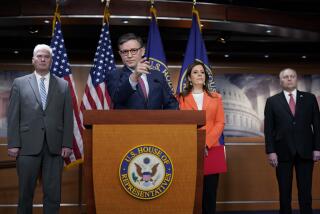The House
AIDS Commission
The House passed, 355 for and 68 against, and sent to the Senate a bill (HR 2881) establishing a commission to advise Congress and the executive branch on combatting AIDS. The panel would parallel President Reagan’s 13-member AIDS commission. It would give lawmakers more stake in the issue, which was largely ignored on Capitol Hill until a few months ago.
Sponsor J. Roy Rowland (D-Ga.) said lawmakers should “put aside partisan politics and philosophical differences” and confront acquired immune deficiency syndrome.
Opponent William E. Dannemeyer (R-Fullerton) said AIDS should be addressed not by “another commission” but by tough policies such as mandatory testing of high-risk population groups.
Members voting yes wanted to set up the AIDS commission.
How They Voted Yea Nay No vote Rep. Bates (D) x Rep. Hunter (R) x Rep. Lowery (R) x Rep. Packard (R) x
Spending Cut
By a vote of 181 for and 245 against, the House refused to cut 2% from discretionary spending categories of a fiscal 1988 appropriations bill (HR 3058) for the departments of Labor and Health and Human Services.
The amendment sought to slice $72.6 million from the legislation’s $36.3 billion outlay for non-entitlement programs. It was rejected after the House repeatedly refused to make larger cuts in the $127-billion measure, the most expensive appropriations bill other than the Pentagon’s.
The bill was sent to the Senate.
Members voting yes favored the 2% spending cut.
How They Voted Yea Nay No vote Rep. Bates (D) x Rep. Hunter (R) x Rep. Lowery (R) x Rep. Packard (R) x
Nuclear Power
The House rejected, by a vote of 160 for and 261 against, an amendment to block federal licensing of completed nuclear power plants at Shoreham, N. Y., and Seabrook, N. H., near the Massachusetts border. A test of House sentiment on nuclear power, the amendment was proposed to a Nuclear Regulatory Commission authorization bill (HR 1315) that was later sent to the Senate. Its effect was to preserve the power of the New York and Massachusetts governors to veto emergency evacuation plans required by the NRC as a condition of licensing.
Supporter Richard A. Gephardt (D-Mo.) said that “safety must be our paramount concern” in setting policy for nuclear power.
Opponent Ralph M. Hall (D-Tex.) said the amendment would set a nationwide precedent for mothballing new nuclear plants.
Members voting yes wanted to block licensing of the Seabrook and Shoreham plants.
How They Voted Yea Nay No vote Rep. Bates (D) x Rep. Hunter (R) x Rep. Lowery (R) x Rep. Packard (R) x
More to Read
Sign up for Essential California
The most important California stories and recommendations in your inbox every morning.
You may occasionally receive promotional content from the Los Angeles Times.










